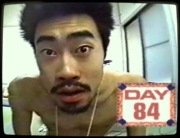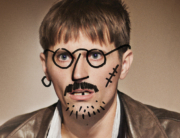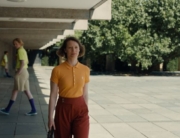
If, while watching Hope Gap, one thinks to oneself, this feels very much like a play, one would be correct in that assumption. It’s based on director/writer William Nicholson’s The Retreat from Moscow. The plot consists of a British couple divorcing after 29 years of marriage. It’s a plot that is old as the hills but certainly worth mining, but there’s not much gold or anything else found in this particular incarnation.
Grace (Annette Bening) and Edward (Bill Nighy) are set to celebrate their 29th anniversary. Grace is the more emotive and forceful of the two, coaxing Edward to express his feelings about their marriage, but Edward is so reserved as to be practically immobile. He asks their only child, Jamie (Josh O’Connor), to come up from London. He has an ulterior motive: he plans to leave Grace this weekend as he’s in love with another woman. He wants his son there to soften the blow and look after his mother.
Grace has a constant need to draw responses out of Edward and her son but not really a willingness to meet either one halfway. She’s a force of will and nature but can only see her side of things, and Edward shrinks under her constant criticism until he leaves. Meanwhile, she goes through the five stages of grief, minus acceptance, and this is the engine that drives the plot. But it’s not enough to get the train up the hill, and Jamie is so thinly written, he barely gets himself out of the station, regardless of O’Connor’s efforts.
Nicholson wrote the screenplay to Gladiator and the excellent play Shadowlands, but here, his powers seem somewhat diminished. The dialogue, for the most part, is polished and erudite, but it isn’t particularly illuminating. There are notable aspects: Grace is devoutly Catholic, and this informs her actions, even if she doesn’t always live up to her beliefs. Also, the setting is a town near the white cliffs of Dover, which makes for some lovely scenery.
There are hints and strands of ideas that might be worthwhile to pursue, such as how Grace’s faith affects her outlook, how Jamie feels about being stuck in the middle, and Edward’s insistence that it was a mistake he and Grace ever met, but Nicholson remains resolutely focused on the clash between her forthrightness and Edward’s reticence. Edward uses Jamie as a go-between to avoid Grace’s wrath so she fully unloads on Jamie, but he is so emotionally passive, we have no idea about how he feels.
Bening and Nighy acquit themselves admirably, as expected. Bening, whose character is the most emotive, expressive, and complicated, stops just short of chewing the scenery. Nighy, a master of eccentric flamboyance, does a lovely job playing a deeply introverted man who flinches at anything close to an extreme emotion.
Hope Gap feels like exactly what it is, a filmed play with interstitial moments—Josh walking along the cliffs, Grace going to a World War I memorial—as placeholders between scenes, while not much imagination went into actually reimagining it as a movie.






Leave A Comment